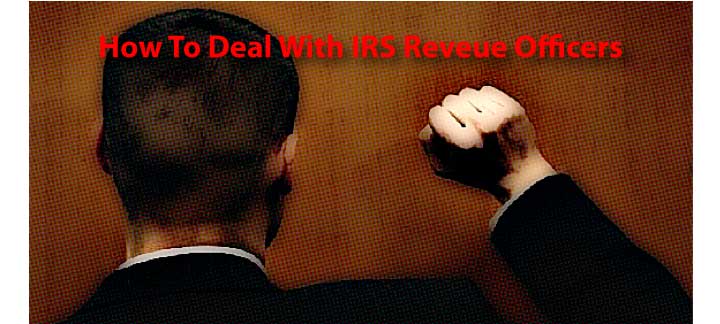How To Deal With An IRS Revenue Officer
What is an IRS Revenue Officer?
An IRS Revenue Officer is an IRS agent whose main purpose is to act as a tax collector for the IRS. Revenue officers perform tax collections duties and are skilled in searching a taxpayer’s assets to find collectable amounts to satisfy any outstanding tax debt. Revenue Officers do not necessarily need to have a financial background in order to be qualified for the job. They typically have a four-year degree. They do not need to be CPAs but they undergo months of training specifically for their position.
What is the Role of an IRS Revenue Officer?
As a tax collector for the IRS, the duties of Revenue Officers include conducting face-to-face interviews with taxpayers, obtaining and analyzing financial information to ascertain their ability to pay the tax bill, designing payment plans to help those with tax arrears pay them over time, and garnishing wages and seizing personal property to pay off delinquent taxes.
IRS Revenue Officers are not necessarily associated with IRS audits. Instead, they are involved in collection proceedings when other collection methods used by the IRS have failed. In particular, the IRS may assign a Revenue Officer to your case if notices, levies, liens, and telephone calls have all been successful. In addition, you may be contacted by an IRS Revenue Agent if you have a history of not paying taxes, you have failed to pay certain taxes, such as payroll tax, or you owe a very large amount of taxes. The IRS Revenue Officer functions to investigate and collect. Therefore they have wide discretion regarding who they can talk to about a taxpayer’s issue. The IRS Revenue Officer has a great deal of power to collect taxes. They frequently initiate levies, liens, garnishments and seizures of taxpayer’s assets.
However, they also have wide discretion to enter into payment plans with taxpayers. Subject to certain limitations, Revenue Officers have discretion in determining whether to accept or reject a proposed installment payment agreement, or other resolution of a tax debt.
How Will an IRS Revenue Officer Contact Me?
The Revenue Officer may contact you to schedule an interview, but on some occasions, Revenue Officers visit taxpayers unannounced. One of their roles is to conduct face-to-face interviews with taxpayers (and/or their representatives) at the taxpayer’s place of business or residence. Occasionally, the pre-schedule interviews may be held at the Revenue Officer’s office.
Depending on the case, the Revenue Officer performs a cold-call, or unscheduled, interview with the taxpayer. This is done as part of the investigative process of collecting delinquent taxes and securing delinquent tax returns. However, Revenue Officers usually only make house calls if balance due notices have not been paid or replied to, phone calls have been unsuccessful or other methods of collection have not been successful.
How a Tax Attorney Can Help Me Deal with an IRS Revenue Officer
A knowledgeable tax attorney has the experience and skill to effectively help you deal with an IRS Revenue Officer. If you receive a letter or a personal visit from an IRS Revenue Officer, you need to respond in a timely fashion in order to preserve your rights. Revenue Officers have the power to garnish wages and take other collection actions, but they also have the ability to enter into an offer in compromise, Installment Agreements, Requests to Classify as Currently Not Collectable, Requesting a Collection Due Process hearing, and other resolution measures. These measures can be complicated and require the skill of an experienced tax lawyer. If you have received notification of a tax collection action, call today for a free consultation.



Comments (0)